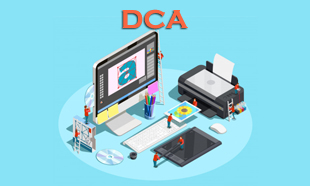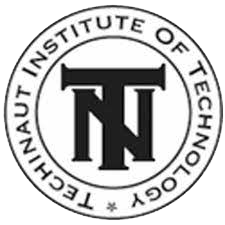0
A Deep Dive into the "Diploma in Computer Application (DCA)" Course at SHREE RADHA KRISHNA INSTITUTE OF COMPUTER SCIENCE, a Techinaut Institute of Technology Franchise in Chandrapur, Maharashtra
In the dynamic landscape of technology, the "Diploma in Computer Application (DCA)" course at SHREE RADHA KRISHNA INSTITUTE OF COMPUTER SCIENCE, a distinguished franchise of Techinaut Institute of Technology in Chandrapur, Maharashtra, is a transformative six-month program designed to equip individuals with comprehensive computer skills. This course aims to bridge the gap between theoretical knowledge and practical application, covering a wide array of topics, from basic computer fundamentals to internet applications. Let's embark on a detailed course exploration, unravelling its objectives and each section.
THE OBJECTIVE OF THE COURSE:
The primary objective of the "Diploma in Computer Application (DCA)" course at SHREE RADHA KRISHNA INSTITUTE OF COMPUTER SCIENCE is to provide participants with a robust foundation in computer applications. The course aims to empower individuals with the skills to navigate the digital landscape confidently. From understanding the basics of computers to exploring advanced applications, the DCA program seeks to prepare participants for various roles, including data entry, office administration, and more.
SECTION 1: BASICS OF COMPUTER
The course commences with a foundational exploration of the basics of computers. Participants delve into the evolution of computers, understanding the components of a computer system and gaining insights into the role of hardware and software. This section ensures a solid understanding of computer fundamentals, laying the groundwork for more advanced topics.
SECTION 2: COMPUTER ORGANISATION
Building upon the basics, the course progresses into computer organisation. Participants explore the architecture of computers, learning about central processing units (CPUs), memory, input/output devices, and storage. Understanding the organisation of computer systems is essential for grasping their functionalities and optimising their usage.
SECTION 3: OPERATING SYSTEM
An in-depth study of operating systems follows, focusing on their role in managing computer resources and facilitating user interaction. Participants become familiar with popular operating systems such as Windows and Linux, gaining practical knowledge in system navigation, file management, and troubleshooting common issues.
SECTION 4: WORD PROCESSING
Proficiency in word processing is a critical skill in today's digital age. This course section focuses on using word processing software, emphasising Microsoft Word. Participants learn document creation, formatting, editing, and the utilisation of advanced features to enhance their word-processing capabilities.
SECTION 5: SPREADSHEET PACKAGE
Spreadsheets are powerful tools for data management and analysis. Participants explore spreadsheet packages in this section, focusing on applications like Microsoft Excel. Topics include data entry, formulas, functions, chart creation, and the utilisation of spreadsheets for organising and analysing information.
SECTION 6: PRESENTATION PACKAGE
Effective communication through presentations is a key aspect of professional life. This section introduces participants to presentation packages, emphasising Microsoft PowerPoint. Participants learn to create visually engaging presentations, incorporating multimedia elements and delivering information effectively to diverse audiences.
SECTION 7: INTRODUCTION TO THE INTERNET
The course delves into the vast expanse of the internet, providing participants with a comprehensive introduction. Topics include understanding the structure of the internet, navigating web browsers, and utilising search engines effectively. This section lays the foundation for more advanced internet applications.
SECTION 8: ELECTRONIC MAIL
Email communication is a ubiquitous aspect of modern business and personal interactions. Participants learn the essentials of electronic mail, covering topics such as composing and sending emails, managing email accounts, and utilising email for professional communication. Practical exercises ensure hands-on experience in email correspondence.
SECTION 9: INTRODUCTION TO PROGRAMMING
An introduction to programming forms a crucial part of the DCA course. Participants are introduced to the basics of programming logic and syntax, gaining insights into the fundamentals of coding. This section provides a glimpse into the programming world, setting the stage for further exploration in subsequent courses.
SECTION 10: DATABASE MANAGEMENT SYSTEM (DBMS)
Understanding database management is pivotal for handling and organising large volumes of data. This section introduces participants to Database Management Systems (DBMS), exploring concepts like data modelling, relational databases, and SQL (Structured Query Language). Practical exercises involve creating and querying databases and enhancing participants' database management skills.
ASSESSMENT AND PROJECT WORK:
Participants undergo regular assessments throughout the course to gauge their understanding and proficiency in each section. Practical projects are integral to the evaluation process, allowing individuals to apply their knowledge to real-world scenarios. This approach ensures a holistic assessment beyond theoretical understanding, emphasising practical application.
INDUSTRY-RELEVANT SKILLS:
The DCA course at SHREE RADHA KRISHNA INSTITUTE OF COMPUTER SCIENCE is designed to impart skills directly relevant to industry requirements. Participants gain hands-on experience with popular software applications and tools used in professional settings. The course structure is aligned with industry standards, ensuring graduates are well-prepared for various roles in computer applications.
GUEST LECTURES AND WORKSHOPS:
The course incorporates guest lectures and workshops by industry experts to provide a broader perspective. Participants can interact with professionals in the field, gaining insights into emerging trends, best practices, and potential career paths. This exposure enhances the learning experience and connects participants with the broader professional community.
CONCLUSION:
The "Diploma in Computer Application (DCA)" course at SHREE RADHA KRISHNA INSTITUTE OF COMPUTER SCIENCE, a Techinaut Institute of Technology Franchise in Chandrapur, Maharashtra, stands as a gateway to a world of digital proficiency. The course equips individuals with a holistic set of skills by covering a diverse range of topics, from basic computer fundamentals to advanced applications. As participants complete the DCA program, they emerge with a diploma and the confidence and competence to navigate the complexities of the digital landscape. Under the Techinaut umbrella, SHREE RADHA KRISHNA INSTITUTE OF COMPUTER SCIENCE continues to shape individuals' futures, providing them with the knowledge and expertise needed to thrive in an increasingly digital world. The DCA course is a testament to the commitment of SHREE RADHA KRISHNA INSTITUTE OF COMPUTER SCIENCE to empower individuals with the tools necessary for success in various professional roles requiring computer application skills.
Lectures = 130 HRS
Practical/Tutorials = 130 HRS
Total = 260 HRS


